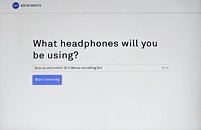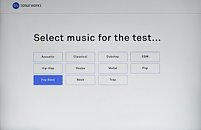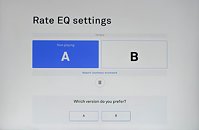Monday, January 14th 2019
Sonarworks Debuts True-Fi Mobile App, Demonstrates Personalized Audio Profiles at CES 2019
If you had not heard of Sonarworks prior to this or the press release that went out last week, you may not be alone. The Latvian company is a little over 6 years old, and has since already managed to grab attention of some of the largest players in the audio market, including car makers interested in stereos, DJs, music producers, and of course more typical headphone and speaker makers. Their True-Fi desktop program claims to calibrate headphones to where everyone is able to hear the same sound no matter where they are- provided you use a supported headphone. This makes use of software sound processing and filtering, and the process works well enough to where they say over 30,000 recording studios worldwide currently use their technology.
At CES 2019, Sonarworks demonstrated the mobile version of their True-Fi program, currently in the Apple and Google Play stores as unreleased versions that will remain free until ready, following which it will cost $3.99/month or $99 for a lifetime license (the desktop version costs $79 by itself at this time). I was able to try out the app at their suite, and then also at home on my own phone, and came out impressed with the changes made. I did happen to have one of the ~300 currently-supported headphones though, and Sonarworks say they are working on adding more all the time. Users can also specifically request support to their own headsets if not on the list, although that might involve round trip shipment to Latvia. Read past the break for more, including their equally exciting personalized audio feature coming later this year.When they first asked us to come take a look at their suite, they hinted strongly that there was more that needed to be experienced in person to be believed. Indeed, now that they had set a baseline of calibrating headphones to a normalized sound signature to then be used in their True-Fi app/desktop program, they wanted to take more advantage of the personalization options available. The current version of the program has some rudimentary functionality here, involving gender, age and basic bass level adjustments for personalization, but they had a working demo of the new feature that honestly blew my mind. This involves using a calibrated headphone, from phase 1 if you will, and listening to a series of sound samples in your preferred music genre. Selecting between a series of two choices helps capture your preferred sound profile across the frequency spectrum, and generates a custom listening profile that, in conjunction with a calibrated headphone and their True-Fi technology, provides for a wonderful listening experience. It got to the point that the the standard headphone experience with the same audio source left me visibly disgusted, and Sonarworks reps were quick to point out that everyone else had the same response.Indeed, perhaps a video recording of the demo sessions and our visual expressions would alone have done wonders for their marketing, but for now I can only describe by words how my experience was. Do note that I did try out a different genre than one they said the effect was going to be even more pronounced (classical vs rock/metal, respectively) and yet there was a remarkable difference. This is contingent on the headphones used of course, and I was able to try out an individually calibrated Marshall Monitor headphone, a more mainstream Beats by Apple headset, and also a set of studio monitor speakers. The effect was pronounced most in the Marshall Monitor headphone, and less so in series to where it was subtle with the speakers. So there is definitely a your-mileage-may-vary placement here, especially as Sonarworks has to add in support for more devices, and continue to capture more listening profiles and feedback to fit into their AI-driven software signal processing engine. We are definitely curious to see the finished version when it comes out later this year, but for now the early access mobile/desktop apps with the phase one headphone calibration will have to do.
At CES 2019, Sonarworks demonstrated the mobile version of their True-Fi program, currently in the Apple and Google Play stores as unreleased versions that will remain free until ready, following which it will cost $3.99/month or $99 for a lifetime license (the desktop version costs $79 by itself at this time). I was able to try out the app at their suite, and then also at home on my own phone, and came out impressed with the changes made. I did happen to have one of the ~300 currently-supported headphones though, and Sonarworks say they are working on adding more all the time. Users can also specifically request support to their own headsets if not on the list, although that might involve round trip shipment to Latvia. Read past the break for more, including their equally exciting personalized audio feature coming later this year.When they first asked us to come take a look at their suite, they hinted strongly that there was more that needed to be experienced in person to be believed. Indeed, now that they had set a baseline of calibrating headphones to a normalized sound signature to then be used in their True-Fi app/desktop program, they wanted to take more advantage of the personalization options available. The current version of the program has some rudimentary functionality here, involving gender, age and basic bass level adjustments for personalization, but they had a working demo of the new feature that honestly blew my mind. This involves using a calibrated headphone, from phase 1 if you will, and listening to a series of sound samples in your preferred music genre. Selecting between a series of two choices helps capture your preferred sound profile across the frequency spectrum, and generates a custom listening profile that, in conjunction with a calibrated headphone and their True-Fi technology, provides for a wonderful listening experience. It got to the point that the the standard headphone experience with the same audio source left me visibly disgusted, and Sonarworks reps were quick to point out that everyone else had the same response.Indeed, perhaps a video recording of the demo sessions and our visual expressions would alone have done wonders for their marketing, but for now I can only describe by words how my experience was. Do note that I did try out a different genre than one they said the effect was going to be even more pronounced (classical vs rock/metal, respectively) and yet there was a remarkable difference. This is contingent on the headphones used of course, and I was able to try out an individually calibrated Marshall Monitor headphone, a more mainstream Beats by Apple headset, and also a set of studio monitor speakers. The effect was pronounced most in the Marshall Monitor headphone, and less so in series to where it was subtle with the speakers. So there is definitely a your-mileage-may-vary placement here, especially as Sonarworks has to add in support for more devices, and continue to capture more listening profiles and feedback to fit into their AI-driven software signal processing engine. We are definitely curious to see the finished version when it comes out later this year, but for now the early access mobile/desktop apps with the phase one headphone calibration will have to do.











7 Comments on Sonarworks Debuts True-Fi Mobile App, Demonstrates Personalized Audio Profiles at CES 2019
So yeah, rather limited support I'd say, but maybe I simply don't own the right headphones?
But with the release of the mobile app maybe more portable headphones like yours will be supported in the future.
Look, I'm not bitter, it's not like I intend to spend money on this, I just wanted to try it out to see if it actually made a difference, but unfortunately I don't seem to own any supported headphones. Obviously they're going to have an impossible task ahead of themselves to support what people already own, so hopefully they continue to offer a free trial period so people can make sure they don't waste money on something that's doesn't support their headphones.
at least it has my Beyer DT770pro80s, my Shure SE215s, and my sony monitors.